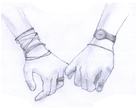 I would like thoughts of peace to be on my mind always, & it seems these days have inspired an even stronger urge to bring peace to the forefront of my thinking. The word peace came to English in the 1100s, meaning freedom from civil disorder. It came to English through Old French from the Latin word pacem or pax. Our modern word pact more closely reflects the initial meaning of peace’s Proto-Indo-European root, pag or pak, which meant to make firm, to join together, to agree. Ah, that we humans of the world might join together & firmly agree on peace. Some modern synonyms for peaceful include: placid, an undisturbed & unruffled calm calm, a total absence of agitation or disturbance tranquil, a more intrinsic & permanent peace than the peace suggested by the word calm. serene, an exalted tranquility harmonious, musical agreement or settled governmental order In lieu of leaving a comment for this post, I’m hoping we can all instead bring peaceful thought & action to the forefront, & maybe, just maybe (with all due respect to Margaret Meade) a small group of thoughtful word nerds can change the world for the better. My thanks go out to this week’s sources: OED, Merriam Webster, Wordnik,Webster’s New World Dictionary, 1959, & Etymonline
1 Comment
 A fascinating construct of linguists is the proto-language, a language we have no direct proof of. Linguists study the earliest languages they can access, find similar words and structures in the languages in a region, and then propose the mother tongue that may have given birth to the tongues spoken in that region. It’s tricky business. One of the most-cited and least questioned proto-languages is Proto-Indo-European, and this week’s post takes a look at the apparent descendants of Proto-Indo-European’s proposed word-part gher- , to grasp or enclose. It’s easy to imagine a word meaning to grasp or enclose turning into the Old English word gyrdel, a belt, sash, or cord worn around the waist, & gyrdel morphing into girdle, initially meaning to cut off a belt of bark around a trunk to kill a tree (1665), & moving from there to mean an elastic corset (1925). I’ll leave the comparison of the intent of those two words to my readers with more direct experience than I. Gher- also seems to have been responsible for the birth of the Old English word geard, a fenced enclosure. From geard come the words yard, & garden. Our modern word orchard was original ortgeard &/or wortgeard, a compound word referring to a geard filled with wort (wort being vegetables, fruits & roots). When those tricky Old English speakers filled a geard with kinder (children), they called it a kindergarten. It also appears that gher- made its way to Greece, where people danced in an enclosure, inspiring the word khoros, which became our modern word chorus, which on its way through France, referred to the enclosure in the church where people sang, the chouer, the parent of our word choir. Gher- also made its way into Latin, where it referred to the king’s enclosure & residence, cohors. In time, cohors grew to label the enclosure itself, the court (which makes our word courtyard redundant). Court also began to refer to the folks within it, both court & cohort. When one of the individuals in that group expressed marital interest, he was said to be courting, & doing so in a gentlemanly fashion earned him the label, courteous. All this from grasping & enclosing? I’d love to hear your comments on any of this, in particular, the darker twists & shadows etymology throws upon words we typically see as positive. My thanks go out to this week’s sources: OED, Merriam Webster, Wordnik, & Etymonline  Though pandemics & such may get in the way, we humans tend to form groups, so it’s no surprise that over the centuries English speakers have come up with countless words to label those groups. I hope you’ll enjoy this collection of words that refer to groups of people. Keep an eye out for those you find remarkable (some of my favorites include a w… of soliders, a s… of nuns & a s… of ascetics). Groups of friends: Circle, clique, host, multitude, & troop Groups of nuns: Convent, nunnery, order, sisterhood, & superfluity Groups of soldiers: Army, band, battalion, brigade, casern, century, company, crue, echelle, file, guard, host, kern, maniple, platoon, soldiery, squad, squadron, troop, velites, & wappenshaw Groups of scholars: Class, form, grade, & school Groups of prisoners: Batch, clutch, colony, & horde Groups of monks: Brotherhood, community, kellion, monastery, order, sangha (Buddhist), & skete (Ascetics) Groups of rogues, ruffians, knaves or thieves: Crue, picaros, gang, horde, mohock, den, ring, thickness, raffle, & ropery What's remarkable in all this? Please leave a note in the comments section. My thanks go out to this week’s sources: OED, Merriam Webster, Wordnik,Etymonline & David W.K. Godrich’s A Gaggle of Geese, 2011 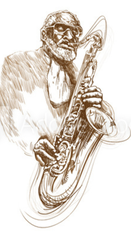 The last couple months I've been working on a new writing project that involves a teen desperate to be a musician. So I've been wallowing around in the wonder of musical terms. Please join me. Since the 1930s, musicians have used the term jam. Etymologists argue over its origin. One school argues that the verb jam and the noun jam session come from the understanding that when playing for their own amusement, musicians try to jam as many notes in as possible. Another school argues that the 1730s understanding of jam, fruit preserves, led to the 1930s musical term, as both are sweet and excellent. A particularly sweet & excellent series of notes might be referred to as a riff, another word over which etymologists bicker. Riff appears to have been in use since 1917 or so. Some connect riff to riffle, as a riffle in a stream, while others suggest it comes from a shortening of the word refrain, which comes from a Latin term that meant to break off. Interestingly, since the 1920s, a musician who improvises a solo (possibly including any number of riffs) is said to be taking a break. The noun gig, meaning job playing music, is quite the mystery, Nobody’s really sure what its origins are, though it showed up among jazz musicians slightly after the turn of the century, soon to be followed by the verb gigging & the past tense verb gigged. As of 1789 an extemporizing pianist was said to be vamping. The great grandmother of the word vamp was the Anglo-French word vaumpe, which refers to the front section of a shoe. It appears that the musical vamp may have come from the fact that the fronts of shoes often had to be repaired, or revamped, & that a good piano player could take an old song and give it new shoes. Giving a song new shoes takes some chops, a word that was first born in 1589 to refer to the flesh that covers the jaws. This leads to the speculation that by the early 1900s when the musical understanding of chops was born, it first referred to the technical facility of a player of a brass instrument. Chops has since generalized beyond music to apply to technical facility of any kind. The original musical axe (or ax) was a jazz saxophone in 1955 (though nobody knows whose saxophone it was). This was apparently because, like the more traditional axe, it could get the job done. By 1955 the term axe was being applied to guitars. Once guitar players got hold of the term, it generalized to refer to almost any musical instrument (though I wonder about the concertina, the triangle, the bagpipes…). Good followers, what instrument should simply never be referred to with the word axe? Also, did anything in this week’s post surprise you? My thanks go out to this week’s sources: OED, Merriam Webster, Ed Gerhard, Wordnik, & Etymonline  Because toponyms occur when we use a place name to refer to something other than the place, it’s logical to assume toponyms would all come from places that exist somewhere on the globe. Some toponyms, though, come from places that exist in our imaginations – from fiction. Shangri La first entered our collective imagination in James Hilton’s 1933 novel, Lost Horizon, in which Shangri La referred to a mystical and harmonious settlement in a difficult-to-reach valley. By 1938 the term Shangri La had come to mean any earthly paradise, the sort of place English speakers after 1610 might have called a utopia. The term utopia was coined by Thomas More in 1516 to refer to a non-existent perfect place. He coined the word by connecting the Greek word parts topos, meaning place with ou-, meaning not. It appears he intended to make it clear that a perfect place could never exist. Ever optimistic, we humans didn’t notice that part, & utopia’s meaning morphed to refer to a perfect place that actually could exist, creating the need to later coin the word dystopia, meaning exactly what Thomas More intended utopia to mean in the first place. Another fictional work, Gulliver’s Travels, by Jonathan Swift, is responsible for a word used since 1726 to mean tiny. Lilliputian comes from Swift’s creation of a place in which thumb-sized people lived. He called his region Lilliput. Initially, the word Neanderthal didn't refer to a group of advanced apes. It referred to a valley near Dusseldorf. Because fossilized humanoid remains were found there in 1856, it got the meaning we think of today. Worthy of remark is the origin of the place name. Before the valley called Neanderthal got its name it was a favorite haunt of German pastor & poet, Jaochim Neander, whose grandfather had Hellenized the family last name, Neumann (new man) to Neander years before. The German word for valley is thal, voila, Neanderthal! By all accounts Pastor Neander was quite civilized & exhibited none of the stereotyped proclivities we modern English speakers associate with the term neanderthal. The German word thal, valley, is also the grandmother of our modern word dollar, which came onto the scene in the 1550s. A particular valley was the home of a silver mine from which coins were minted as early as 1519. The mine was in a valley named after a chap called Joachim, Joachimsthaler, which was also the name initially given to the coin. In time, poor Joachim got dropped and thaler became dollar. I suppose this would make Joachim the unappreciated grandfather of the dollar. Good readers, what say you about all this toponym foolishness, or the probability of one blog post including two different Joachims? My thanks go out to this week’s sources: OED, Fact Index, Wordnik, & Etymonline 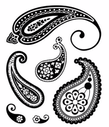 English abounds with toponyms – ideas, actions, or things named after places. I hope you enjoy considering this smattering of toponyms. Paisley – now a distinctive shape we print onto fabric, but originally a town in Scotland where such fabric was first made. Interestingly, the word paisley comes through Middle Irish from the word baslec, which came from the Latin word basilica, which means that the town was originally identified by its church. Today, the word babel refers to a confused medley of sounds, but originally it referred to Babhel, the capital of Babylon. Babhel is a Hebrew word that started out as Bab-ilu, an Accadian word meaning the gate of God, which causes those of my generation to wonder what Ricky Riccardo was really singing about. Our modern colors burgundy & magenta are both toponyms. Burgundy was originally a region in France named in Late Latin with the term Burgundiones, which translates to highlanders. In time, the wine of the area picked up the name, and the deep hue of the wine gave us the word burgundy as it refers to color. On the other hand, the town of Magenta was where the Sardinians & French teamed up to fight the Austrians during the Second Italian War of Independence in 1859. The town was originally named after Marcus Aurelius Valerius Maxentius. It wasn’t until a few short years after the battle that a deep reddish purple dye was discovered in that region, and voila, magenta. Even in the 13th century some folks (well, royalty, anyway) enjoyed relaxing at the spa. Our modern word spa is a toponym taken from Spa, Belgium, a town blessed with mineral hot springs. The town’s name came from the Walloon word espa, which meant spring or fountain. Because many of New York’s financial institutions ended up situated along the wall that once offered defense to the struggling Dutch town of New York, the adjacent street was named Wall Street. That struggling little town has done all right for itself to the point that we now use this toponym to refer to the entire American financial world. My niece & nephew used to refer to those lovely plastic playgrounds some fast food restaurants offer as king cities. Any of you here in California will easily fill in the etymology on that one. In the meantime I’m hoping you’ll use the comments section to suggest new toponyms we should insert into the language. My thanks go out to this week’s sources: OED, Fact Index, Wordnik, & Etymonline  Some word pairs are confusing because they sound alike but have different meanings (like the ones in last week's post). Some word pairs are confusing because we've made them that way. Two bits of confusion involve the word pairs form/from & definitely/defiantly. In my humble opinion, the from & form confusion is a matter of typing more than a homonym issue. We just get typing away & muck it up. The confusion between definitely & defiantly, however, is another matter altogether. I’ve been grading English papers since the 1970s, & in my experience, these two words were never confused before computers. The confusion didn’t even exist with the first raft of word processors. I call this phenomenon a spellcheck-induced error. It occurs because many of us type definAtely instead of definItely. Our spell-checker “reads” our intentions & comes up with defiantly (which contributes to some hysterical sentences). Almost all forms of dessert/desert came to English through French. Dessert came to English in the 1500s in reference to the last course of a meal. The French word it came from is deservir, which translates to un-serve (because serving the last course involved clearing the table of the previous courses). The wasteland meaning of desert came to English in the 1200s from Old French, which came from the Late Latin word desertum, which meant thing abandoned. It wasn’t until the 1700s that tdesert began to mean a waterless, treeless region. The desert which means suitable reward or punishment (as in getting one’s just deserts) came through French from the Latin word deservir (not to be confused with the afore-mentioned French word deservir). It meant to serve well. I suppose one is served well by getting what one deserves. But so much for nouns – the verb desert came through the Old French deserter in the 1300s from the Latin desertare (closely related to desertum), which meant to abandon. This particular desert is built of the word parts de-, meaning opposite or undo, & serere, meaning to put in a row. Serere also gave birth to the word series. We’ll finish this post with by, bye & buy. By has been around since Old English was born. By came from a Proto-Germanic word meaning about, near, or around. Though we pronounce it differently today, we find by’s sister (with the same meaning) at the end of place names that end in –by. In Yorkshire alone there are over 210 place names ending this way (Wetherby & Selby, for instance). Our modern word buy, came from another Proto-Germanic source, the word bugjan, meaning to pay for. When it first entered English, the soft g sound remained at the end of the word, & is one of the reasons buy's past tense form, bought includes the letter g. The completely unrelated word bye is a shortening of good-bye, which in the 1570s was spelled godbwye and was interestingly a shortening of something else -- the term God be with ye. Thanks for joining me for another Wordmonger post. Please leave any comments in the comments section. My thanks go out to this week’s sources: OED, Place Names in England, Wordnik, & Etymonline  English is filled with words that appear to be related, but, as Ira Gershwin suggested, “It ain’t necessarily so.” For instance, shouldn’t taut have some sort of relationship with taught? Taut showed up in the 1200s, spelled tohte. All this time it has meant stretched or pulled tight. Chances are good it came from on Old English word meaning to pull or drag, which also eventually led to the words tie, tow & duke (no kidding). The word taught also came from Old English, but its root word was spelled tahte, the past tense of taecan, to teach. As much as these two homonyms sound identical, it turns out the commonalities they share are 1) they both originated in Old English, & 2) neither one has changed meaning for centuries. Another pair of confusion-creating homonyms is immanent & imminent. The first came from Latin through French in about 1530 and means indwelling or inherent. Its root word immanere meant to dwell in. Imminent, which came from Latin through French about the same time, means near at hand or impending. Imminent was formed by adding im- (meaning in) to minere (jutting out). Principle seems as though it should be related to principal. Showing up in the 1200s, principle meant origin, source, or elemental aspect. It came from the Old French word, principe, which started off as the Latin word principium, meaning beginning, origin or foundation. And surprise, surprise, our modern word principal actually did come from the same Latin source, but while travelling through French it became principal, meaning dominant, main, or most important. Heading further back into that particular Latin family tree we also find words that have grown to become our modern words prince, princess, & prime. And what’s up with violet & violate? Those two words together hardly seem appropriate. Showing up around 1300, the word violet came through Old French from the Latin word viole, which referred both to the flower we call the violet & its distinctive color. On the other hand, the word violate appeared about a century later from the Latin word violatus, meaning to treat with violence, dishonor or outrage. And while we’re on that note, how about the violin, the viola & the bass viol? These words all came from Latin through French, too, but the Medieval Latin grandmother word was vitula, meaning a stringed instrument, probably inspired by the Roman goddess of joy, Vitula (whose name also provided the beginnings of the word fiddle). Good readers, what other pairs of words do you think ought to be related? Please, mention them in the comments section. I’m hoping to do a second post featuring your suggestions. My thanks go out to this week’s sources: OED, Etymonline, Merriam Webster, & Wordnik, 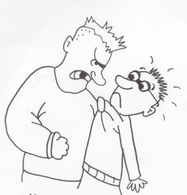 Please join me in enjoying a few carefully chosen, not terribly disgusting put-downs -- putdowns for lightweights. A blighter is a contemptible fellow, one as terrible as a disease, a parasite, one who inspires blight. Though blighter, which came to the language in 1822, clearly comes from the word blight, which entered the language in the early 1600s, the origins of blight are unknown. Some etymologists lean toward an Old Norse origin of a word meaning to become pale (blikna). Others have suggested it may be a form of the Old English word blaece,a scrofulous skin condition. I have ignorantly always assumed the put-down cretin voiced someone’s negative opinion of the people of Crete. Wrong. Cretin, a slight against someone’s intelligence, actually comes from the Swiss French word crestin, which meant Christian. Apparently, somewhere in the Alpines there was a high incidence of a thyroid condition that severely limited its victims’ mental and physical growth. By a fluke, the region also happened to be the home to the earlier Christians in the area, thus the connection. During World War II, the term dirtbag was used to refer to the garbage collector. In time, the term extended to refer to a filthy, vile, sleazy, grimy, or disreputable person. Flibbertigibbet entered English in the 1540s, and referred to a flighty, chattering gossip. It comes from the earlier term flibergib, which referred to the gossip or nonsense itself. Experts agree that freak seems to have shown up in the 1560s, originally meaning a sudden turn of mind. A short list of “proposed” origins follows: -from Old English frician, to dance -from Middle English freike, a bold man, warrior or creature -from Middle English frek, bold, quick -from Proto-Germanic, freko, active, eager man, warrior or wolf -from Old English frec, greedy or gluttonous Today, a frump is a dull, cross & unstylish person. Frump came to English in 1600s meaning a sneer, jeer or hoax, probably from the noun frumple, a wrinkle. I have hopes that this probable source is true, as I love the idea of a word meaning wrinkle referring to each of those three very separate ideas: a sneer, a jeer, & a hoax. Dear followers, I’m certain you’d never use such words on living, breathing, people. Still, I'm hoping you'll have something to say about these words' origins. My thanks go out to this week’s sources: OED, Etymonline, & Wordnik, & Hugh Rawson’s book Wicked Words 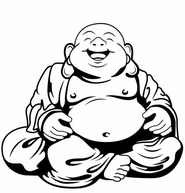 In these troubled times, we could all use some laughter. So here's a look into words and idioms related to laughter. What’s funnier than a pun? Entering the language in 1826, the funny-bone is exactly that. Not only does a good whack on the elbow make us feel funny, the elbow is positioned at the end of the humerus. Ha! And again I say Ha! When we try a joke that doesn’t have the desired affect, we refer to this as laying an egg. This term was born in the late 1800s. Its origin is due to the fact that hens make a big deal of laying an egg, with much squawking & clucking, though their peers appear unimpressed. In the 1570s the word corny came to English from the Sanskrit word jirna, which meant old & worn out. Corny can mean old fashioned, mawkish & sentimental, uncool due to a failed attempt at coolness, trite, or an attempt at humor that falls flat. The word comedy entered English in the late 1300s, through French from the Greek komodios, meaning village singer. Though the village singer might have sung any sort of song, somehow the funny ones have lived on etymologically. Centuries ago when Romans were doing what Romans did, that included plowing the fields. When a farmer was unable to plow in a straight line, his work was referred to as de lire, meaning off track, out of line. In the 1590s this Latin term made its way into English as delirious & delirium, as someone experiencing delirium is off-track and has a tough time returning the old plow to the furrow. This next one isn’t really about a laughter-related word, but I’m including it because upon reading this etymology, I laughed. In the sport of horse-racing, skittish horses can often be calmed by placing a goat in their stall (who knew?). In the early 1900s, nefarious jockeys would steal their opponent’s horse’s calming goat in hopes of increasing the edginess of the opponent’s horse while increasing the likelihood the nefarious jockey might win. This practice gave birth to the idiom getting one’s goat. In the 1630s, the term happy as a clam in the mud at high tide found its way to English. Our modern version has been truncated to happy as a clam, & has lost two salient bits, as the big idea of the idiom was that a clam in the mud at high tide could not be harvested & was therefore, happy. In the 1630s, English speakers began using the term sardonic laughter to refer to laughter that wasn’t genuine and might seem a bit stretched. This comes from a Greek term that defined the twitchy, stretched-smile symptoms people displayed after eating a particular plant from Sardinia. The symptoms generally ended in death. On a nearly lighter note, the idiom tickled to death comes from a myth regarding a method of torture said to have been used in China. Better than dying from eating a Sardinian plant, but still, not a great way to go. Any giggles, titters or guffaws? My thanks go out to this week’s sources: OED, Etymonline, & Wordnik, & Jordan Almond’s Dictionary of Word Origins |
I write for teens & tweens, bake bread, play music, and ponder the wonder of words in a foggy little town on California's central coast.
To receive weekly reminders of new Wordmonger posts, click on "Contact" & send me your email address. Archives
November 2023
|


 RSS Feed
RSS Feed